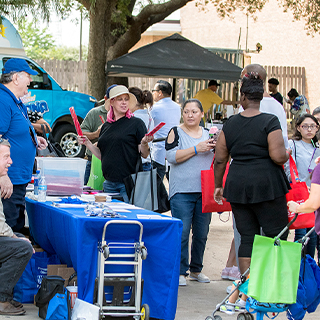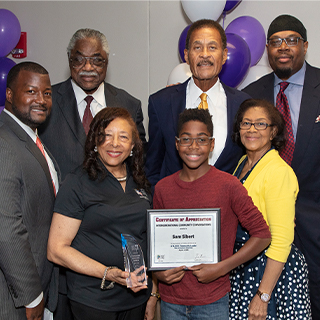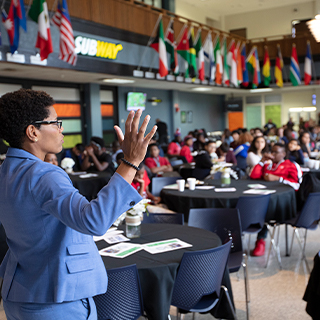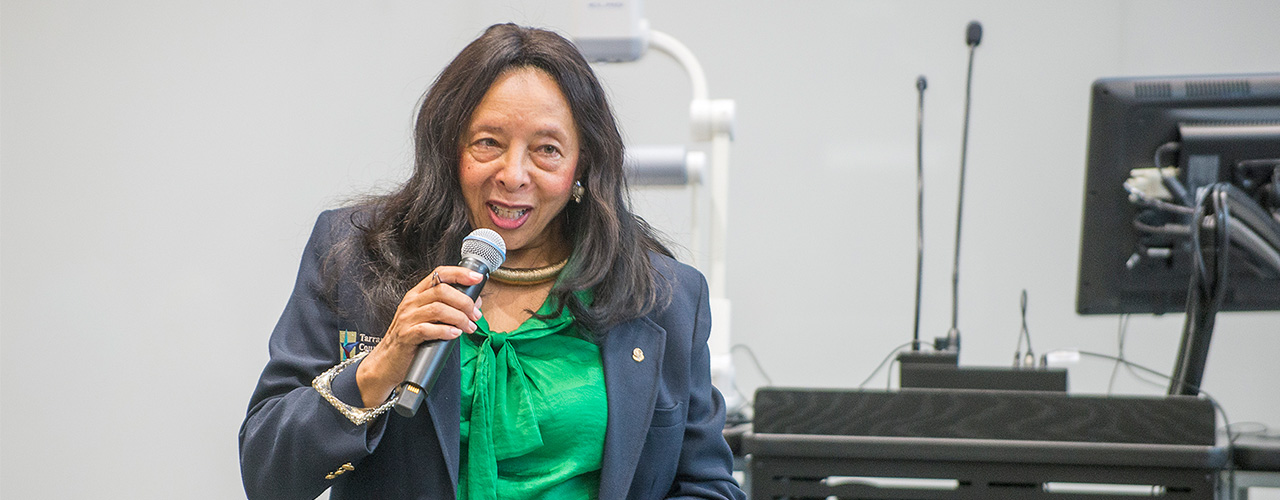Taking TCC to the Community
Trustee Gwen Morrison is All About Engaging the Community
If you want to make Gwendolyn Morrison’s day, tell her that you are engaged.
Morrison, the District 6 representative on Tarrant County College’s Board of Trustees, has spent her life bringing people together to build common bonds. She refers to it as ‘getting people engaged,’ which she describes as a new name for an old concept—making people feel like a welcome part of a concept so they embrace it.
“I love it that the Chancellor says we have to be a student-ready campus. That’s the expectation—build this beautiful, shiny campus, and people will come. But the truth of the matter is that in some cases, it might be a little intimidating for some people,” Morrison says. “So, the way I see it, it’s more important to take the College to the community. I see that as more of my role. And, I want the College and staff to feel that wherever they are, the College is, too. Whether they’re at their churches, their community, their neighborhood, their block, at the grocery store, they are the community’s access to the College. And how I act models that belief. My events are just an embellished way of presenting the idea of the College to the community.”
Morrison has been a TCC trustee continuously since 1976, when she was elected as an at-large candidate and has served her constituents in District Six after it was created in 1988.
District Six includes East and Southeast Fort Worth, Forest Hill, Everman and part of Southwest Fort Worth.
From the start, Morrison has been dedicated to building common bonds between individuals and generations through tangible initiatives. Over her tenure, her vision has evolved into an event calendar of six activities, which either TCC sponsors or partners with groups to host on the South Campus or at the TCC Opportunity Center, located by Dunbar High School in South Fort Worth. All of the events serve as opportunities for people to share opinions and ideas, and to take those ideas back to their neighborhoods and families.
“The true meaning of these events is to have that conversation and to carry that conversation to the new generation and to create new conversations,” Morrison said. “People do not go where they are not invited or where they do not feel welcome. And once they are there, they don’t stay unless they are engaged. And so, that’s why we have discussions where people can raise their voices and participate in a very respectful way.”
 As the youngest of 17 children in Neches, a small community located about 30 miles
southwest of Tyler in East Texas, Morrison learned the importance of people communicating
and cooperating to build a family and community. Those lessons set the stage for the
way she has interacted with people her entire life and nurtured her belief in being
involved in leadership roles in organizations and events that matter to her.
As the youngest of 17 children in Neches, a small community located about 30 miles
southwest of Tyler in East Texas, Morrison learned the importance of people communicating
and cooperating to build a family and community. Those lessons set the stage for the
way she has interacted with people her entire life and nurtured her belief in being
involved in leadership roles in organizations and events that matter to her.
Her involvement with Texas 4-H clubs in grade school developed her leadership and public speaking skills, which led to being valedictorian in high school and securing her undergraduate and master’s degrees from Stephen F. Austin State College, where she was voted Miss Stephen F. Austin and Outstanding Student Woman and served as president of Gamma Sigma Sigma Sorority.
“The thing that most impressed me was that everybody on campus was very friendly, and they always spoke to you. It was a very welcoming environment,” she said, noting that her experience helped form her belief that a welcoming, inclusive attitude is essential to a school’s efforts to bond with people as a way of becoming a vibrant part of the community.
“Community engagement was different when I first joined the Board. So, basically, it was like you went to your board meetings and you showed up at events if you were invited,” Morrison explained. “I wanted to do more. I felt the need to engage the community in a systematic way. I have been fortunate that I have had the opportunity to interact with older women in the community. These were women who were business owners or educators who had that iconic presence. And, they had been trailblazers in their communities and in their professions.
“I wanted younger people to have that kind of connection with history. I didn’t want people to lose the value of those lessons. So, I wanted to share that.”
After embracing the idea of promoting community engagement with TCC as her mission, the biggest challenge Morrison faced was determining how to do it effectively. She decided the solution involved bringing together community members of all ages to start dialogues they would carry back to their family and friends. And what better place to do it than TCC facilities?
It is so important that education is a part of the thought process, and for me, education means that TCC is part of everything that happens. It has become very important that TCC becomes involved with every aspect of the community. Whenever anybody thinks of training people or educating people, I want them to say ‘Let’s talk to the people at TCC. How can TCC help us? What are they doing that we can partner with?’
Gwendolyn Morrison
District 6 Representative,
Tarrant County College's Board of Trustees
Intergenerational Community Conversation
From that point, it was only a matter of how and where to start. Her answer was to create the first Intergenerational Community Conversation (The Conversation) in 2012.
Held in the fall of each year, the TCC-sponsored Conversation spotlights TCC as a positive force and resource in the community and showcases TCC as a viable and valuable resource to high school students and others who are considering returning to school.
“I wanted to bring together people—even some of the people who went through that first class at TCC—and talk about what TCC has meant to the community,” said Morrison. “I wanted to help young people to see what it still can do for them and the community. That TCC should be their first college of choice. I wanted every student to believe that, regardless of where else you plan to go to school, you should all apply and think about going to Tarrant County College. So, I came up with this concept of the intergenerational conversation. And invited people by sending out letters to community leaders and community thought leaders—‘influencers’ we call them now, that wasn’t a term then—and invited them to be part of that conversation.
“My idea was to plant that seed and to bring people together and have students and faculty and staff to accept that concept as their own. To embrace it, but to embellish it in their own way. To bring their own genius to it. Over the last eight years, it has changed and grown, and it has become different from what I envisioned. But the goal is still the same,” said Morrison.
 Stop Six Shape-Up
Stop Six Shape-Up
Seeing the success of the Conversation prompted Morrison to launch the Stop Six Shape-Up in 2014, designed to help local residents address the needs and nature of their area. Stop Six is a community on Fort Worth’s east side.
Morrison sees the Shape-Up as a way to create the initial ripple that spreads ideas and information throughout the area.
“The concept was ‘What do you need to do to shape up a community? What are all of the aspects of a community?’ There’s health, there’s wealth, there’s development. All of those factors need to be engaged and all moving forward on an upward spiral if you’re going to revitalize and keep the community going,” she explained. “We have people engage the community in health and wellness and economic development to bring it to a personal level. And also different training programs, experts come in and talk to the community about what you can do to enhance your earning power and the earning power of your family.”
Because of its tradition of close-knit family ties, she recognized that the community had a natural resource for carrying the ideas and information to their family and friends. “I truly engaged the grannies, aunties and the networks in the neighborhood because the aunties and the grannies have the time to go out and gather the information, and then they can bring it to the grandson or the nephew or the niece who needs that information and that sense of direction.”
Morrison also focused on local community groups that served children at early ages because “we wanted to engage churches and schools, child care centers and other organizations that impact children directly. Everybody wants to talk about kids going to college when they get to high school. But we need to start talking about it when they are in elementary school,” Morrison said.
State of the Six
Recognizing that the Conversation needed to include elected and public administrative officials, Morrison extended the concept of the Stop Six Shake-Up in 2014 to create State of the Six, a community report-style event where TCC leaders meet with officials to exchange information and ideas and get their input on their challenges. The group meets every December at a TCC facility.
“I want to develop a relationship with all of the elected officials and TCC so that TCC is on the top of their minds. And I want TCC to be the school-of-choice for everybody who lives here,” she said. “When they think about training they might need, the first thing I want them to say is ‘What does TCC offer? How can TCC help me to do this?’
“The State of the Sixth is an opportunity for all of the elected and appointed officials to get together to talk about the challenges they’re facing and all of the challenges that they are addressing on behalf of the community. And how they can partner with the community and with TCC to better accomplish that service.”
 Breakfast with Our Elders
Breakfast with Our Elders
Capitalizing the “I” in Intergenerational Community Conversation as the key to successful interaction, Morrison started the Breakfast with Our Elders event in 2015. The annual breakfast brings together families to develop a better sense of TCC’s heritage and how it still is a relevant resource today in their lives.
Ordinarily, this event is held on the first Friday of August. But the COVID-19 pandemic reshaped it into a virtual event that brought a limited number of students and their families together to explore ideas and meet TCC leaders, faculty and representatives. Hopefully, Morrison says, in the post-COVID-19 period, the discussions will resume as an important in-person opportunity to boost attendees’ awareness of the College and identify ways that TCC can benefit them.
“I felt that we needed to do something else to really connect high schoolers to TCC and people in the community. So, we identified people who had been part of education and leadership in the community and at TCC and had a breakfast. We invited them to bring their families and to bring students from kindergartens and childhood centers. We also made sure to include student athletes from Dunbar High School. We let them know some of what we’re doing, but we also let them honor the elders,” she explained.
African-American Health Expo
TCC South is the original home of the College’s nursing program. Though many nursing programs have moved to TCC Trinity River East, TCC South still is home to several related programs, including physical education, massage therapy and kinesiology.
So, it seems natural that TCC South spent many years as the home for the African-American Health Expo, a wide-ranging collection of speakers, service providers and public health programs that address health issues that are relevant to the county’s African-American community. The event traditionally has been held annually in April to coincide with African-American Health Month. Post-COVID-19, the Expo is expected to move to the William M. McDonald YMCA in South Fort Worth.
Juneteenth Celebration
Prior to COVID-19, TCC planned to substantially increase its involvement with the 2020 edition of Juneteenth, the celebration of the June 19, 1865 announcement of the abolition of slavery in Texas. The pandemic forced Juneteenth organizers to adapt several events to a virtual environment and stage limited-attendance events in Downtown Fort Worth. Post-COVID-19, TCC plans to have TCC South host the celebration, which is expected to attract many first-time visitors to campus.
“It is important not just for the day but because of the concept of empowerment that comes with it and what it represents,” said Morrison. “I think it has a tremendous impact and serves as an eye-opener for many people.
“What I want is for people to embrace the campus as their own. As I see it, it is a chance to be invited, be welcomed, be engaged and be valued. By having that familiarity with the campus, it gives people that feeling. And, it’s one they will carry away with them.”
Beyond the celebration, the opportunity to host Juneteenth, says Morrison, is special because “It reminds me of my days at Stephen F. Austin College because of the familiarity that people can gain and the affinity that can come from that. That’s why it is so important. It brings people together on campus for meaningful activities in which they are engaged.”
Unity in the Community
For the past three years, TCC has sponsored a monthly Unity in the Community event to bring families to TCC South to get information, access resources and build familiarity with TCC. The Tarrant Area Food Bank’s Mobile Pantry participates to distribute food and personal items to attendees. It also is a way for TCC to create a favorable impression that will last long after the event.
“It is so important that education is a part of the thought process, and for me, education means that TCC is part of everything that happens,” Morrison said. “It has become very important that TCC becomes involved with every aspect of the community. Whenever anybody thinks of training people or educating people, I want them to say ‘Let’s talk to the people at TCC. How can TCC help us? What are they doing that we can partner with?’”
What's Next?
One would think that such a full agenda would be enough for someone who obviously has fulfilled the challenge that she set for herself nearly a half-century ago.
But as one might suspect, Morrison doesn’t see it that way. “My new word is ‘NEXT.’ My focus is on what’s next. What can we do better? How can we serve better? How can we reach further to the top, deeper to the bottom and enlarge our engagement better? So that’s what’s next.”

